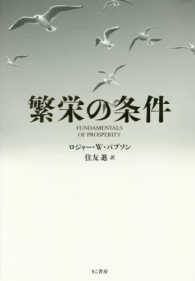Full Description
After the Realist Revolution extends the existing academic study of American common law into new and previously unexplored areas. Marin Scordato examines the conventional understanding of appellate court lawmaking and the profound change in the common understanding of that activity that occurred during the mid-twentieth century. Scordato argues that this change in the conventional account of common law can be best understood as an authentic paradigm shift, akin to those described by Thomas Kuhn in The Structure of Scientific Revolutions. The book also sheds light on the ways in which the current instrumentalist approach to appellate court lawmaking is influenced and, in some respects, compromised by the structures and procedures that were created during the prior formalist era. Thorough and insightful, After the Realist Revolution is an ideal resource for legal scholars and general readers interested in the nature and evolution of American common law.
Contents
1. Introduction; 2. The traditional understanding of lawmaking by appellate courts; 3. The realist critique of the traditional understanding and the paradigm shift from formalism to instrumentalism; 4. What does appellate lawmaking look like under an instrumentalist paradigm? The Tarasoff case as an exemplar; 5. Problematic aspects of instrumentalist appellate court lawmaking within a formalist framework; 6. Other aspects of current American law that reflect the paradigm shift from formalism to instrumentalism; 7. Stipulations, clarifications, and elaborations; 8. Empirical Instrumentalist Analysis: Understanding the Absence of a Duty to Reasonably Rescue in American Tort Law; 9. Conceptual instrumentalist analysis: understanding the purpose and function of causation in tort law; 10. The paradigm shift from formalism to instrumentalism and constitutional law; 11. The nature of legal scholarship in the post-realist period; 12. Conclusion.







